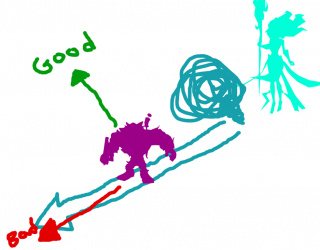The other day I was talking to a software programmer who mostly does outsourcing work for game developers. He told me that video games are the only place where there are interesting problems to be solved in computer science; everything else is either an engineering exercise (networking, multimedia software) or completely out of our reach (artificial intelligence). This explains why somebody like John Carmack, who doesn’t seem to really care about games and spends his spare time building space rockets, would give a crap about our stupid hobby: it’s one of the few games in town for really advanced problem solving that uses his skillsets.

This got me thinking about game design as well. It seems as though that is the one area of media that we are still learning about as well. Sure, as individuals people need to keep relearning filmmaking techniques or music theory, but we as a society understand these things completely. In fact, we can now science our way into making an extremely popular song or movie (let’s disregard personal taste here, because that isn’t always just impacted by the media itself). Even if you don’t care for the music written by a computer, it’s likely that you listen to a great deal of older music that is still just as powerful now as the day that it was released. Video games are different, because there are no hard and fast rules defining how to make one that people really like. You can’t really teach somebody game design, all we really have are some rules of thumb about what usually works and what doesn’t. There is also a measure of success that doesn’t exist in other mediums, because simply making a game that people can/want to finish is an additional challenge that we have to deal with.

I actually don’t want to just talk about video games though, I want to talk about us, our species. For our entire reign on earth we have faced problems. Wars, famine, development of new technology that grants us freedom...those were all exciting problems that everybody in the world could get involved in. We chose to go to the moon in that decade and do the other things, not because they were easy, but because they were hard. Even the people who weren’t directly solving these problems were interested in them, and we all derived a great sense of satisfaction seeing just what we were capable of.
We don’t seem to have any of these problems now though. Well, ok, we HAVE many problems. Third world hunger, overpopulation, global warming...these are definitely big problems that need solving. But we don’t seem to have the energy to tackle them anymore. Talented individuals work very hard to deal with them, but the full weight of society just isn’t behind the multitude of issues that we face. Many people have claimed that this is due to our relevant comfort, and I think that’s part of it but not the whole story. I think that there is a deeper driving force within both the collective and typical individuals that is missing in tackling these problems. Maybe we need a charismatic leader, maybe we need something to happen close to home that will wake us up, maybe we need some good propaganda...I don’t know.

We certainly have a drive to solve problems: that’s what a video game is, it’s a set of problems. But now instead of solving the real problems around us we’re busily making game problems for each other. This can be really healthy, because it grants us new insights, viewpoints and skills that we wouldn’t get from regular, every day interaction. But if we never learn to deal with the real world through these exercises, then we’re satisfying only the most basic part of our need for problems, and not putting that drive to good use. That drive...it’s what got us where we are. We should not squander something so great. If video games are the only area of puzzle solving that we have any interest in working on, then we’ve essentially given up on the outside world and fallen upon self-engineering, which is something that has been predicted in the past (technology as the next form of human evolution). And what are we left with when we have engineered ourselves into happiness? Can you design human satisfaction? Do we really want to?

What am I trying to say? I don’t pretend to fully understand myself. On some level, I guess I’m trying to come to terms with the general lack of depth and meaning that I feel in my life, and see in others. If I’m right about this on a broader level, then game enthusiasts are at the focal point of a really big problem that we aren’t going to be able to handle. Given that I’ve been wanting to make video games for my whole life, I am faced with a special quandary: is that even the right thing to be doing? Can I make games that push people to be excited about real world problems? Will anyone help me to do so?
Maybe we’re at the point where we’ve %100 completed the game of human interest. When that happens in a game, we usually spend some more time playing around with all of our new toys, but that gets boring fast. When you S-rank a game there are only really two options:
Move on to a new game...
Or start over.
Log in to comment